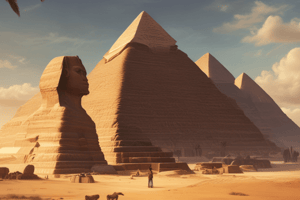Podcast
Questions and Answers
Who was the pharaoh honored by the pyramid that stood 200 feet tall?
Who was the pharaoh honored by the pyramid that stood 200 feet tall?
- Khufu
- Menkaure (correct)
- Khafre
- Horus
What major construction took place around 2490 B.C. in ancient Egypt?
What major construction took place around 2490 B.C. in ancient Egypt?
- The Great Pyramid at Giza
- Hieroglyphic writing was developed
- The unification of Upper and Lower Egypt
- The construction of a 200-foot-tall pyramid (correct)
What does 'ca' stand for in historical contexts regarding ancient Egypt?
What does 'ca' stand for in historical contexts regarding ancient Egypt?
- Constructed around
- Confirmed around
- Ceased around
- Circa (correct)
What period is known as the 'Age of the Pyramids'?
What period is known as the 'Age of the Pyramids'?
What two kingdoms emerged in ancient Egypt?
What two kingdoms emerged in ancient Egypt?
What significant change occurred in Egypt around 1938 B.C.?
What significant change occurred in Egypt around 1938 B.C.?
Which period followed the Second Intermediate Period in ancient Egypt?
Which period followed the Second Intermediate Period in ancient Egypt?
How did women in ancient Egypt differ from those in many other ancient cultures?
How did women in ancient Egypt differ from those in many other ancient cultures?
What was the purpose of the Book of the Dead in ancient Egyptian culture?
What was the purpose of the Book of the Dead in ancient Egyptian culture?
What was one of the major contributions of ancient Egyptian astronomers?
What was one of the major contributions of ancient Egyptian astronomers?
Flashcards
Ancient Egypt Civilization
Ancient Egypt Civilization
One of the longest-lasting civilizations in the world, lasting more than 3,000 years, known for its art and engineering.
Pyramids of Egypt
Pyramids of Egypt
Large stone structures built to honor pharaohs, showcasing impressive engineering.
Early Dynastic Period
Early Dynastic Period
Period in ancient Egypt (ca 3100 B.C. to ca 2575 B.C.) where pharaohs unified the land and used hieroglyphics for record-keeping.
Old Kingdom
Old Kingdom
Signup and view all the flashcards
Lower Egypt
Lower Egypt
Signup and view all the flashcards
Middle Kingdom of Egypt
Middle Kingdom of Egypt
Signup and view all the flashcards
Second Intermediate Period of Egypt
Second Intermediate Period of Egypt
Signup and view all the flashcards
New Kingdom Egypt
New Kingdom Egypt
Signup and view all the flashcards
Pyramid Development
Pyramid Development
Signup and view all the flashcards
Ancient Egyptian Afterlife Beliefs
Ancient Egyptian Afterlife Beliefs
Signup and view all the flashcards
Study Notes
Ancient Egyptian Civilization
- Ancient Egyptian civilization lasted over 3,000 years, one of the world's longest-lasting.
- Originating around 6000 BCE, small villages evolved into states, forming Upper and Lower Egypt (Nile River flowed south to north).
- By 3100 BCE, the two kingdoms unified under a pharaoh, marking the beginning of recorded history.
Periods of Ancient Egypt
- Early Dynastic Period (ca 3100 BCE - 2575 BCE): Early pharaohs consolidated power, claimed divine protection, and developed hieroglyphic writing for record-keeping (taxes, decrees).
- Old Kingdom (ca 2575 BCE - 2150 BCE): Characterized as the "Age of Pyramids," known for the construction of large pyramids by powerful pharaohs. Associated with the sun god Ra.
- First Intermediate Period (ca 2130 BCE - 1938 BCE): Pharaohs lost power due to drought; local leaders assumed control.
- Middle Kingdom (ca 1938 BCE - 1630 BCE): Reunification under Mentuhotep II; significant art production, story-telling, and construction of Karnak Temple started.
- Second Intermediate Period (ca 1630 BCE - 1540 BCE): Weak pharaohs; Hyksos invaders ruled the north, Kushites ruled the south.
- New Kingdom (ca 1540 BCE - 1075 BCE): Reconquest and the reign of well-known pharaohs such as Hatshepsut, Akhenaten, Tutankhamun, and Ramses II, a peak period of prosperity and power. Ramses II constructed numerous memorials, including statues at Abu Simbel.
- Third Intermediate Period (ca 1075 BCE - 656 BCE): Drought, famine, and foreign invasions; some pharaohs, like Taharqa (from Kush), rebuilt temples and even initiated pyramid construction again.
- Late Period (ca 656 BCE - 332 BCE): Native Egyptian rule ended as King Darius I (Persia) took control.
- Macedonian and Ptolemaic Egypt (332 BCE - 30 BCE): Alexander the Great conquered Persia; Ptolemy I Soter, a Greek general, became ruler and Greece ruled. Cleopatra VII, the last Ptolemaic ruler, lost to Octavian (Rome).
Life in Ancient Egypt
- Most people were farmers living near the Nile River, cultivating crops (wheat, barley, flax, papyrus, and more) assisted by flood cycles.
- Monumental constructions (pyramids, tombs) were created during flood seasons by surplus labor.
- Scribes and people like priests and doctors also made up part of the population
- Women enjoyed more freedoms than other ancient cultures; they had similar rights, could own property, and had jobs as doctors, priests, and scribes.
- Egyptians enjoyed leisure activities like boating, playing games, music, and dance.
The Afterlife
- Egyptians believed in an afterlife similar to their life, lasting into the next realm.
- Mummification and tombs were crucial for the soul's journey.
- Graves were filled with provisions, games, and clothing for the next life.
- Gods like Anubis guided souls, and Osiris judged them.
- Other gods (Isis, Tefnut) were believed to have roles in everyday living.
Importance Today
- Ancient Egyptian monuments attract millions of tourists annually.
- Egyptians developed a solar calendar and are credited with early math and multiplication techniques.
- These people developed the hieroglyphic writing system; symbols represented words/sounds, with writings in major historical sites for documentation.
- Egyptians worshipped over 2000 gods and goddesses.
Studying That Suits You
Use AI to generate personalized quizzes and flashcards to suit your learning preferences.




